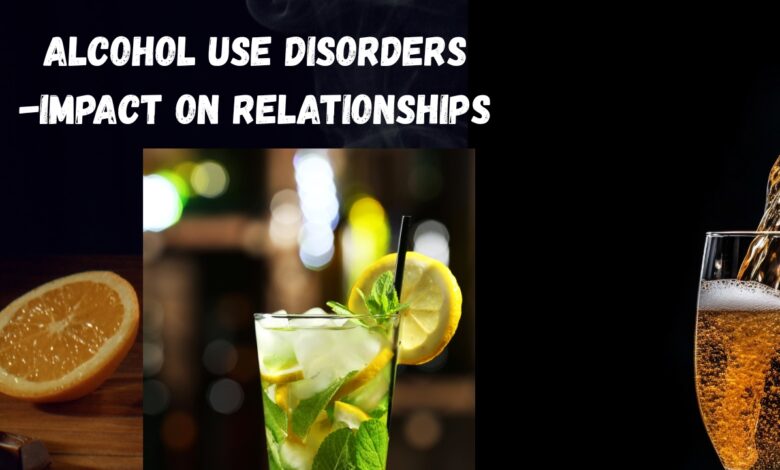Understanding Alcohol Use Disorders: A Deep Dive into the Impact on Relationships Top 10

When it comes to alcohol use disorders, we’re not just talking about someone who enjoys a drink now and then. We’re diving into a serious issue that affects millions of people worldwide. If you’ve ever wondered how this can ripple through someone’s life, especially in terms of relationships, you’re in the right place. Let’s get the ball rolling and explore this topic together.
Table of Contents
The Basics of Alcohol Use Disorders
Alcohol use disorders, or AUDs, are characterized by an individual’s inability to control their alcohol consumption despite knowing the negative consequences. It’s not just about drinking too much at a party. It’s a chronic disease that can range from mild to severe.
You might be thinking, “How does one even get here?” Well, it’s a mix of genetic, environmental, and psychological factors. For some, it’s in their genes. For others, it’s the environment they grew up in or the stressors they face daily. And sometimes, it’s a cocktail of all these factors. Understanding these underlying causes can be essential for those looking to support someone with an AUD.
Impact on Family Dynamics
Family is supposed to be our safe haven, right? But when alcohol use disorders come into play, things can get a bit rocky. Picture this: a parent who consistently drinks might not be present for their child’s milestones. Birthdays, school plays, or even just reading a bedtime story might get overshadowed by the haze of alcohol.
As a result, children may feel neglected or even blame themselves for their parent’s absence. It’s a heavy burden for young shoulders to bear. This can lead to significant emotional and psychological impacts that last well into adulthood, influencing their own relationships and self-perception.
Moreover, partners of those with AUDs often find themselves in a constant state of worry. Are they safe? Will they come home tonight? It’s an emotional rollercoaster that can strain even the strongest of bonds. The unpredictability of living with someone who has an AUD can lead to chronic stress and anxiety, which can, in turn, affect physical health.
Friendships and Alcohol Use Disorders
Friends are like the family we choose. But what happens when alcohol starts dictating the terms of that friendship? You might have a buddy who’s always the life of the party, but when drinking becomes a necessity rather than a choice, it’s a red flag.
Friends might feel the need to distance themselves, especially if they’re constantly dealing with broken promises or reckless behavior. It’s tough to watch someone you care about spiral, and yet, there’s that lingering hope that they’ll turn things around. But, how long can you wait? This distancing can be painful but sometimes necessary for one’s own mental health and well-being.
The person with the AUD might also feel isolated, leading to a vicious cycle where they drink more to cope with the loneliness, further straining friendships. It’s a complex situation where both the individual and their friends may feel helpless.
Romantic Partnerships and Challenges
Now, let’s talk about love. Romantic relationships are built on trust, understanding, and mutual respect. But throw in an alcohol use disorder, and you’ve got a recipe for disaster. Imagine planning a romantic dinner, only for your partner to show up late and intoxicated. It’s not just disappointing; it’s heartbreaking.
Over time, these instances can lead to resentment and a breakdown in communication. One partner might feel they’re constantly playing the role of caretaker rather than an equal. It’s a tough spot to be in, and sometimes, love alone isn’t enough to weather the storm.
The constant stress of dealing with an AUD can also lead to emotional exhaustion, where the non-drinking partner feels trapped in a cycle of hope and despair. This emotional toll can make it hard to focus on personal needs and growth, further exacerbating relationship issues.
Breaking the Cycle: Seeking Help
So, what can be done? Recognizing there’s a problem is the first step, and it’s a big one. From there, seeking professional help can make all the difference. Therapy, support groups, and sometimes medication are viable options.
For families and partners, supporting a loved one with an alcohol use disorder requires patience and understanding. It’s important to set boundaries while also encouraging them to seek help. Believe me, it’s easier said than done, but it’s worth it in the long run. It’s crucial to remember that while you can support, the decision to change ultimately lies with the person struggling with the disorder.
Real-Life Stories and Lessons
To bring this closer to home, let me share a story. A dear friend of mine struggled with alcohol for years. It was heartbreaking to watch her miss out on so many opportunities. But the turning point came when she realized the impact her drinking had on her young daughter. That was her wake-up call.
She sought help, and while the journey wasn’t easy, she persevered. Today, she’s a beacon of hope for others facing similar challenges. Her story is a testament to the fact that change is possible, even when the odds seem stacked against you.
Such stories highlight the importance of community and support systems. Recovery is rarely a solitary journey. It involves friends, family, and professionals who can provide guidance and encouragement.
FAQs on Alcohol Use Disorders
What are the early signs of alcohol use disorder?
Early signs often include a strong craving for alcohol, inability to limit drinking, and experiencing withdrawal symptoms when not drinking. These symptoms can start subtly and gradually become more pronounced over time.
Can alcohol use disorders be cured?
While there isn’t a “cure,” AUDs can be effectively managed with the right treatment and support, allowing individuals to lead fulfilling lives. Long-term recovery is possible and can lead to healthier, more stable relationships.
How can I support a loved one with an alcohol use disorder?
Encourage them to seek professional help, attend support groups with them, and be there to listen without judgment. Setting boundaries is also crucial for your well-being. Remember, taking care of yourself is equally important to be able to support them effectively.
Is it possible to have a healthy relationship if one partner has an alcohol use disorder?
Yes, but it requires open communication, professional intervention, and mutual effort to address the disorder while maintaining the relationship. Both partners must be committed to overcoming challenges together, with honesty and patience.
Alcohol use disorders are complex, affecting not just the individual but everyone around them. By understanding the nuances and seeking help, it’s possible to heal and rebuild relationships. If you or someone you know is struggling, remember, it’s never too late to reach out for help. Life can be better, and love, stronger than ever.
Also Read:Foods Can Help Combat Erectile Dysfunction
Conclusion
In conclusion, addressing alcohol use disorders is a multifaceted process that involves acknowledging the problem, seeking help, and rebuilding damaged relationships through compassion and understanding. Whether you’re directly affected or supporting someone who is, remember that recovery is a journey, and with the right tools and support, a brighter future is within reach.




